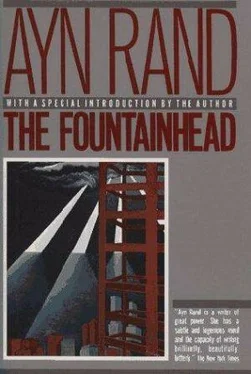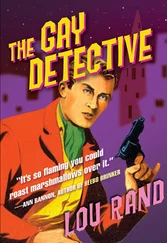"Is that Howard Roark's signature?"
"Yes."
"Will you please read the terms of this agreement to the jury?"
Keating read it aloud. His voice came evenly, well drilled. Nobody in the courtroom realized that this testimony had been intended as a sensation. It was not a famous architect publicly confessing incompetence; it was a man reciting a memorized lesson. People felt mat were he interrupted, he would not be able to pick up the next sentence, but would have to start all over again from the beginning.
He answered a great many questions. The prosecutor introduced in evidence Roark's original drawings of Cortlandt, which Keating had kept; the copies which Keating had made of them; and photographs of Cortlandt as it had been built.
"Why did you object so strenuously to the excellent structural changes suggested by Mr. Prescott and Mr. Webb?"
"I was afraid of Howard Roark."
"What did your knowledge of his character lead you to expect?'
"Anything."
"What do you mean?"
"I don't know. I was afraid. I used to be afraid."
The questions went on. The story was unusual, but the audience felt bored. It did not sound like the recital of a participant. The other witnesses had seemed to have a more personal connection with the case.
When Keating left the stand, the audience had the odd impression that no change had occurred in the act of a man's exit; as if no person had walked out.
"The prosecution rests," said the District Attorney.
The judge looked at Roark.
"Proceed," he said. His voice was gentle.
Roark got up. "Your Honor, I shall call no witnesses. This will be my testimony and my summation."
"Take the oath."
Roark took the oath. He stood by the steps of the witness stand. The audience looked at him. They felt he had no chance. They could drop the nameless resentment, the sense of insecurity which he aroused in most people. And so, for the first time, they could see him as he was: a man totally innocent of fear.
The fear of which they thought was not the normal kind, not a response to a tangible danger, but the chronic, unconfessed fear in which they all lived. They remembered the misery of the moments when, in loneliness, a man thinks of the bright words he could have said, but had not found, and hates those who robbed him of his courage. The misery of knowing how strong and able one is in one's own mind, the radiant picture never to be made real. Dreams? Self-delusion? Or a murdered reality, unborn, killed by that corroding emotion without name — fear — need — dependence — hatred?
Roark stood before them as each man stands in the innocence of his own mind. But Roark stood like that before a hostile crowd — and they knew suddenly that no hatred was possible to him. For the flash of an instant, they grasped the manner of his consciousness. Each asked himself: do I need anyone's approval? — does it matter? — am I tied? And for that instant, each man was free — free enough to feel benevolence for every other man in the room.
It was only a moment; the moment of silence when Roark was about to speak.
"Thousands of years ago, the first man discovered how to make fire. He was probably burned at the stake he had taught his brothers to light. He was considered an evildoer who had dealt with a demon mankind dreaded. But thereafter men had fire to keep them warm, to cook their food, to light their caves. He had left them a gift they had not conceived and he had lifted darkness off the earth. Centuries later, the first man invented the wheel. He was probably torn on the rack he had taught his brothers to build. He was considered a transgressor who ventured into forbidden territory. But thereafter, men could travel past any horizon. He had left them a gift they had not conceived and he had opened the roads of the world.
"That man, the unsubmissive and first, stands in the opening chapter of every legend mankind has recorded about its beginning. Prometheus was chained to a rock and torn by vultures — because he had stolen the fire of the gods. Adam was condemned to suffer — because he had eaten the fruit of the tree of knowledge. Whatever the legend, somewhere in the shadows of its memory mankind knew that its glory began with one and that that one paid for his courage.
"Throughout the centuries there were men who took first steps down new roads armed with nothing but their own vision. Their goals differed, but they all had this in common: that the step was first, the road new, the vision unborrowed, and the response they received — hatred. The great creators — the thinkers, the artists, the scientists, the inventors — stood alone against the men of their time. Every great new thought was opposed. Every great new invention was denounced. The first motor was considered foolish. The airplane was considered impossible. The power loom was considered vicious. Anesthesia was considered sinful. But the men of unborrowed vision went ahead. They fought, they suffered and they paid. But they won.
"No creator was prompted by a desire to serve his brothers, for his brothers rejected the gift he offered and that gift destroyed the slothful routine of their lives. His truth was his only motive. His own truth, and his own work to achieve it in his own way. A symphony, a book, an engine, a philosophy, an airplane or a building — that was his goal and his life. Not those who heard, read, operated, believed, flew or inhabited the thing he had created. The creation, not its users. The creation, not the benefits others derived from it. The creation which gave form to his truth. He held his truth above all things and against all men.
"His vision, his strength, his courage came from his own spirit. A man's spirit, however, is his self. That entity which is his consciousness. To think, to feel, to judge, to act are functions of the ego.
"The creators were not selfless. It is the whole secret of their power — that it was self-sufficient, self-motivated, self-generated. A first cause, a fount of energy, a life force, a Prime Mover. The creator served nothing and no one. He had lived for himself.
"And only by living for himself was he able to achieve the things which are the glory of mankind. Such is the nature of achievement.
"Man cannot survive except through his mind. He comes on earth unarmed. His brain is his only weapon. Animals obtain food by force. Man has no claws, no fangs, no horns, no great strength of muscle. He must plant his food or hunt it. To plant, he needs a process of thought. To hunt, he needs weapons, and to make weapons — a process of thought. From this simplest necessity to the highest religious abstraction, from the wheel to the skyscraper, everything we are and everything we have comes from a single attribute of man — the function of his reasoning mind.
"But the mind is an attribute of the individual. There is no such thing as a collective brain. There is no such thing as a collective thought. An agreement reached by a group of men is only a compromise or an average drawn upon many individual thoughts. It is a secondary consequence. The primary act — the process of reason — must be performed by each man alone. We can divide a meal among many men. We cannot digest it in a collective stomach. No man can use his lungs to breathe for another man. No man can use his brain to think for another. All the functions of body and spirit are private. They cannot be shared or transferred.
"We inherit the products of the thought of other men. We inherit the wheel. We make a cart. The cart becomes an automobile. The automobile becomes an airplane. But all through the process what we receive from others is only the end product of their thinking. The moving force is the creative faculty which takes this product as material, uses it and originates the next step. This creative faculty cannot be given or received, shared or borrowed. It belongs to single, individual men. That which it creates is the property of the creator. Men learn from one another. But all learning is only the exchange of material. No man can give another the capacity to think. Yet that capacity is our only means of survival.
Читать дальше










